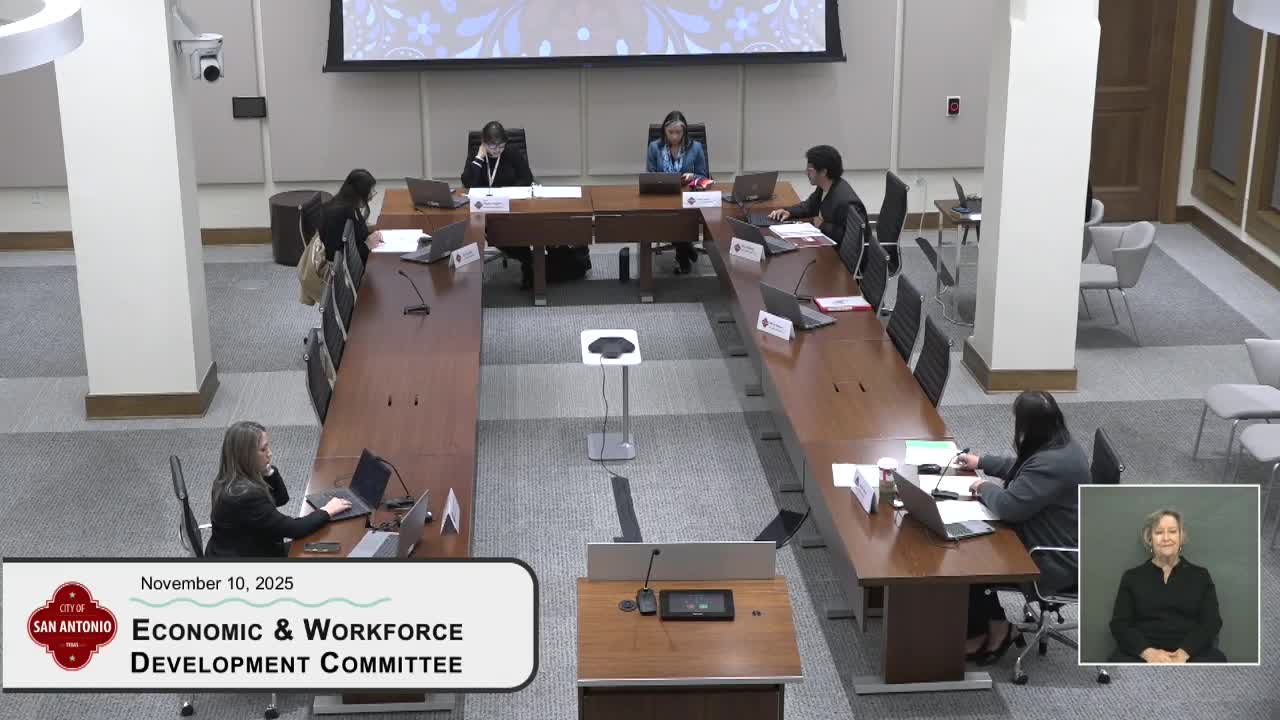San Antonio committee hears Ready to Work update as officials weigh wage floor to broaden small‑business participation
Get AI-powered insights, summaries, and transcripts
Subscribe
Summary
Council staff presented an update on the Ready to Work on‑the‑job training (OJT) program during the Nov. 10 Committee on Economic and Workforce Development meeting.
Council staff presented an update on the Ready to Work on‑the‑job training (OJT) program during the Nov. 10 Committee on Economic and Workforce Development meeting. The presentation summarized early outcomes from initial cohorts and described proposed changes to expand participation by small businesses.
The program, staff said, began two years ago and delivered its first agreements about 20 months ago. In the initial round the presenter said there were six small employers, six large employers and 32 participants in one category and 155 participants overall through Nov. 3, 2025. Staff reported retention and hiring figures: "74 por 100" (74%) of participants were newly hired by participating employers in the first cohort; among workers already employed with a participating employer for more than six months retention was reported at 93%.
Staff described wage outcomes for the first cohort: starting wages were reported at about $24.87 in San Antonio and rose to $25.22; other trainings showed smaller hourly increases (presenter cited figures such as $0.32–$0.33 per hour for some cohorts). For OJT, staff said seven participants received promotions and that roughly 60% of participants received promotions in another cited figure. Round 2, staff said, included 77 employers and approximately $5.9 million in training awards; those contracts were reported as being executed at the time of the presentation and staff expect results in the coming months.
Staff reviewed program rules and proposed adjustments for the next contracting round. Requirements for employer participation include hiring for full‑time, benefit‑eligible positions and employing program graduates. The presenter said the program currently proposes a $20‑per‑hour minimum for new positions, but staff are proposing lowering the wage floor to $15 per hour to enable more small businesses to participate. Reimbursement rules described: the program reimburses 50% of training costs at completion of training and pays the remaining 50% when the employer applies the first wage increase; maximum awards cited were $100,000 per business, with higher reimbursement rates (up to 75%) for very small businesses and additional reimbursement up to $15,000 to support employers hiring people with justice‑system records.
Councilmembers asked detailed questions about employer incentives, integrated services for participants and the program's capacity to address childcare needs. Staff said the city council previously approved a childcare subsidy for single parents participating in Ready to Work and that the program can pay those childcare costs while participants are in training, with an emphasis on locating convenient, high‑quality child care near participants’ homes or workplaces. "...nuestros grupos más grandes son las madres solteras," staff said when describing the program's enrollment and supports.
Members also asked whether federal policy or changing labor demand had affected hiring; staff said partners report higher applicant volumes and increased competition for open positions, and that the program helps position participants near the top of applicant lists. Members raised industry concerns such as training for emerging fields (artificial intelligence and semiconductors) and asked staff to provide district‑level or zip‑code level data and to follow up on which employers are participating.
The presentation concluded with staff saying they expect to open a new application period for the next round of contracts and to provide updates when Round 2 outcomes are available.
The committee did not take a formal vote on program changes during the session; the item was presented for information and discussion and staff said they will return with further details for implementation.
